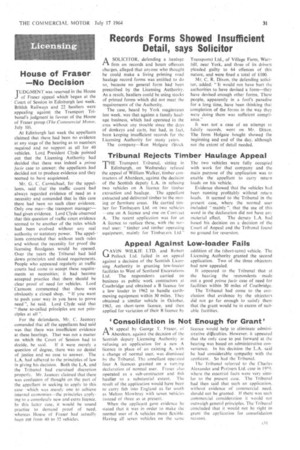House of Fraser No Decision
Page 33

If you've noticed an error in this article please click here to report it so we can fix it.
JUDGMENT' was reserved in the House of Fraser appeal whielf.began at the • Court of Session ini Edinburgh last week. British Railways and 22 hauliers were appealing against the Transport Tribunal's judgment in favour of the House of Fraser group (The,Commerdal Motor, July 10).
At Edinburgh last week the appellants claimed that there had been no evidence at any stage of the hearing as to numbers required and no support at all for .40 vehicles. Lord President Clyde pointed out that the Licensing Authority had 'decided that there was indeed a prima fade case to answer; the appellants had decided not to produce evidence and they seemed to have aCquiesced.
Mr. G. C: Carmichael, for the appellants, said that the traffic courti had always regarded evidence of need as a necessity and contended that in this case there had been no such clear evidence. Only one man—the transport manager— had given evidence, Lord Clyde observed that this question of traffic court evidence seemed to be another of the rules which had been evolved without any real authority or statutory power. The appellants contended that without such rules and without the necessity for proof the licensing floodgates would be opened. Over the years the Tribunal had laid down principles and stated requirements. People who appeared regularly at traffic courts had come to accept these requirements as necessities; it had become accepted practice that there should be clear proof of need for vehicles. Lord 'Carmont commented that there was • obviously a closed shop. " If you want to push your way in you have to prove need ", hi said. Lord Clyde said that " these So-called principles are not principles at all ".
For the defendants, Mr. C. Jauncey . con tended that all the appellants had said • was that there was insufficient evidence at these hearings. That was not a matter on which the Court of' Session had to decide, he said. If it were merely a question of degree, there was no denial of justice and no case to answer. The L.A. had adhered to the principles of law in giving his decision. Both the L.A. and the Tribunal had exercised discretion proper!), Mr. Jauncey claimed that there was confusion of thought on the part of the appellant in seeking to apply to this case-which was merely one to achieve internal economies —the principles applying to a completely new and extra licence. In this latter ease, it would be sound practice to demand proof of need. whereas House of Fraser had actually been cut from 40 to 32 vehicles.
















































































































